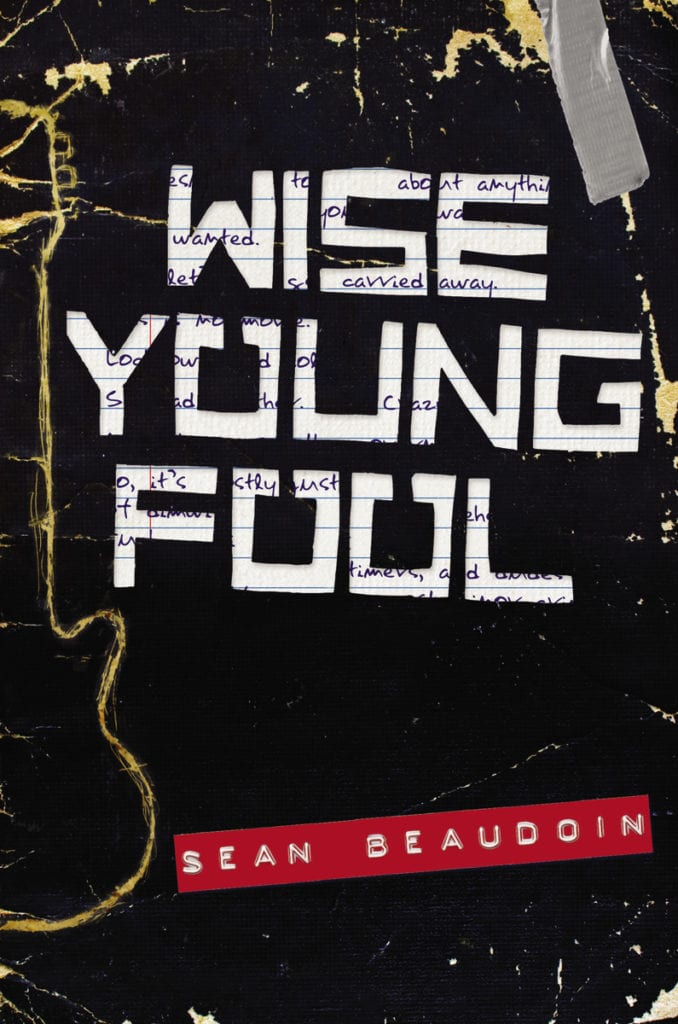“Give me some genuine emotion. Challenge yourself to be honest instead of merely clever.”
 I read Wise Young Fool for the first time months and months ago. I have read many and many books since now and then. And yet. And yet Wise Young Fool has stuck with me through all that. And yet Wise Young Fool is a book I can’t get away from when I start thinking about not just my “favorites” of 2013 but the books I read in 2013 that I admired, deeply, on a craft level and was, to no small degree, awed by. Wise Young Fool is a work of art – no really – that is about the power of art, it’s a book that is profoundly sarcastic and mean but also deeply moving. All these months and months later I am still thinking about how all the pieces of it fit together. THAT is the kind of book Wise Young Fool is.
I read Wise Young Fool for the first time months and months ago. I have read many and many books since now and then. And yet. And yet Wise Young Fool has stuck with me through all that. And yet Wise Young Fool is a book I can’t get away from when I start thinking about not just my “favorites” of 2013 but the books I read in 2013 that I admired, deeply, on a craft level and was, to no small degree, awed by. Wise Young Fool is a work of art – no really – that is about the power of art, it’s a book that is profoundly sarcastic and mean but also deeply moving. All these months and months later I am still thinking about how all the pieces of it fit together. THAT is the kind of book Wise Young Fool is.
In a simple summary: Wise Young Fool is the story of how Ritchie Sudden ended up serving 90 days in a juvenile detention facility and, more specifically, the 90 entries in the “diary” he is forced to keep inside said facility, detailing how it is he ended up there. So, it’s a frame story: the frame of the juvenile detention facility journal revealing the larger story of Ritchie’s life leading up to it. It is also a frame story about how the completed journal has, ostensibly, ended up at Little, Brown and is now being published. I know, that feels gimmicky, but Wise Young Fool is really about performances, both the deliberate observed on a stage kind and the deeper, sadder kind we sometimes do to keep people at a distance, and so this second frame story – the idea that Ritchie’s journal, not Sean Beaudoin’s novel, is now being published by Little, Brown – is actually essential to the story Beaudoin is telling about art and performance. I do not at all think that Beaudoin believes he is “tricking” his teen readers into believing this is “all true” – that’s lazy. I think, instead, he is asking something bigger of them; he is asking them to observe a story about performance as performance and to believe in the legends we tell. And he is asking them to step outside the story and consider it as story. This is ambitious and clever and it really works because it makes you, the reader, believe in Ritchie Sudden as a whisper and a possibility; a kid you might know and a song you might be humming.
Wise Young Fool, then, is a frame story inside a frame story – the journal from the juvenile detention facility framing the story of the year that got Ritchie there and then the larger frame of the manuscript making it to Little, Brown. I love this kind of daring, I love this kind of craft. Beaudoin’s intricacy and care with the narrative is one of the things I admire most about the book. But, oh, there are many others.
For instance: I love that this book is all about relationships … but not in the way you think. This is a book about an extraordinarily close friendship between two slightly off-kilter guys, Ritchie and his bandmate and best friend El Hella. (Elliot to you) I love a friendship in YA done right: not perfect, but about how a real friend is there through all the mess of your life. This is a book about the relationship Ritchie has with Looper, the woman who is his mother’s new girlfriend. (Looper showed up when Ritchie’s dad left.) Looper doesn’t cut Ritchie any shit and, better still, she talks to him not like an adult but like an adult talks to a teenager that they respect and care for. It’s a really fully realized relationship and a great example of an adult who is present and there in a teen’s life – can never get enough of that in YA, after all.
And of all the great relationships in this book, best of all, this is also a book about the relationships between Ritchie and two girls: Ravenna and Lacey. Ravenna is the girl Ritchie has always loved from afar and Lacey is the girl that likes him more than he likes her. And in a lesser book these girls would be lesser characters. Yet in Wise Young Fool, Ritchie learns how wrong he was about both Ravenna and Lacey and, more than that, they are completely realized characters with their own agency and with their own selfish wants. Ravenna isn’t just the luscious, sex-bomb dreamgirl Ritchie has lusted over. Lacey isn’t just the complacent nice girl who pines for Ritchie. They have their own wants and they make their own mistakes – they connect with Ritchie and even change him in some ways but they do not revolve around him. He is not their whole story and, by that same token, they are not his whole story either. Ravenna and Lacey are fully realized characters who make the narrator richer and more complicated and they just happen to be girls that he is involved with, drawn to, and compelled to know. Ain’t that a kick in the head?!
Wise Young Fool is exceptionally clever and exceedingly funny. Ritchie has a smart mouth that never quits and Beaudoin has a particular gift for the kind of high school boy shenanigans that make you wince and grin at the same time. There are genuine laugh out loud moments laced through a book that is also about serious pain and loss. Ritchie’s loss and pain are great and not so easily escaped. When Ritchie finds himself in the juvenile detention facility, he thinks that all he needs to do is keep his head down but the brilliance of Wise Young Fool is that it’s really a book about finally taking action in your life and finally confronting the grief and pain you’ve just been trying to keep your head down about. Ritchie’s journal, his time in the juvenile detention facility; that’s all part of his song and all part of the way Ritchie learns it’s time for him to become active in his life again, to start healing and start coping and, yeah, start living.
There is darkness, grief, and loss in Wise Young Fool but also such damn resilience. It’s a book about how we survive and how we tell our stories through art and creation. And maybe more than anything, Wise Young Fool is a book about finding the right sounds for YOUR life and YOUR family and friends and YOUR story.
Without a doubt, it’s one of my favorite books of 2013. All these months and months later and I am still thinking about it. And I feel sure that if you give it a try, you will be too. It’s highly recommended as a first purchase for public libraries and as the exactly perfect book to suggest for your teens that love music, art, sad stories, funny stories, and something so real and true it aches. It’s on sale now and if you can’t buy a copy, go check one out from your local library. If they don’t have copy, suggest they purchase it.
BUT ALSO! Because he is the best (and possibly because one night I fangirl’ed over him so hard I scared him a little?)
the awesome and amazing Sean Beaudoin has agreed to give away A SIGNED COPY of Wise Young Fool to one lucky reader.
All you have to do to be entered is leave a comment and I’ll select a random winner. (Recent winners include Lauren of The Raucous Librarian, who won the Meg Medina books and Karen from Yorkville, IL, who won the Anne Ursu book. You could be next!)
Wise Young Fool and Ritchie Sudden – the way he gets lost in his pain but pulled back into the world through the strength of the people who believe in him and the power of the music he hears and strums out – they are the song. I know, if you hear it, you’ll sing along.



You have convinced me – I need to read this!
I always trust your opinion.
My daughter is reading this book now. I would love to present her with a signed copy.
Oooo! Me! If you say I need to read it, I need to read it!
If you want to give me this awesome sounding book, who am I to say no?
Adding to my TBR list!
I’ve been meaning to read this one to share with my Detention Center teens – if you say it’s this good, it’s going right to the top of my list!
Wesley Payne was such a tour de force, I am really, really anticipating thus one. Appreciate your glowing endorsement.
You’ve sold me on it! Adding to my list.